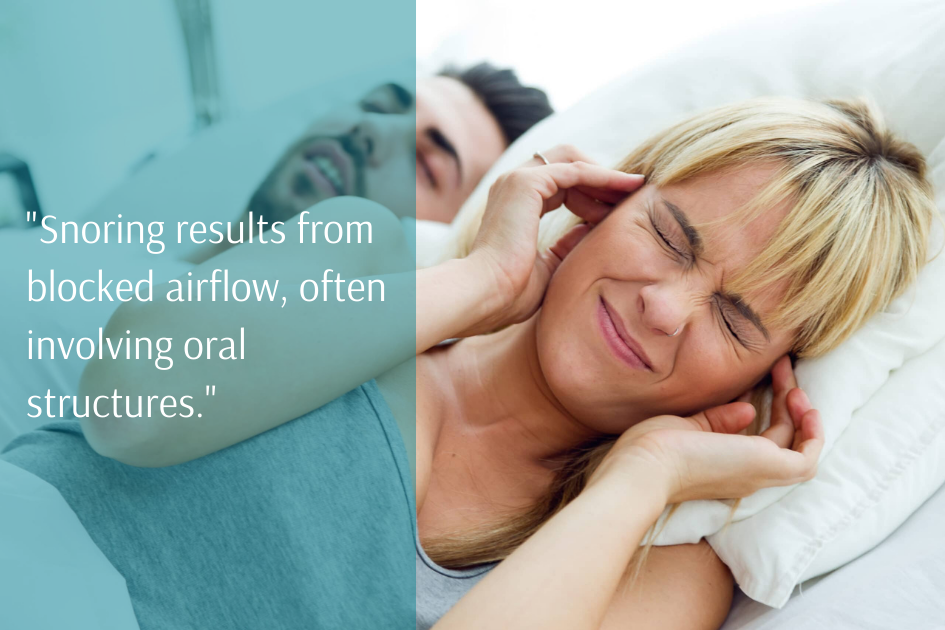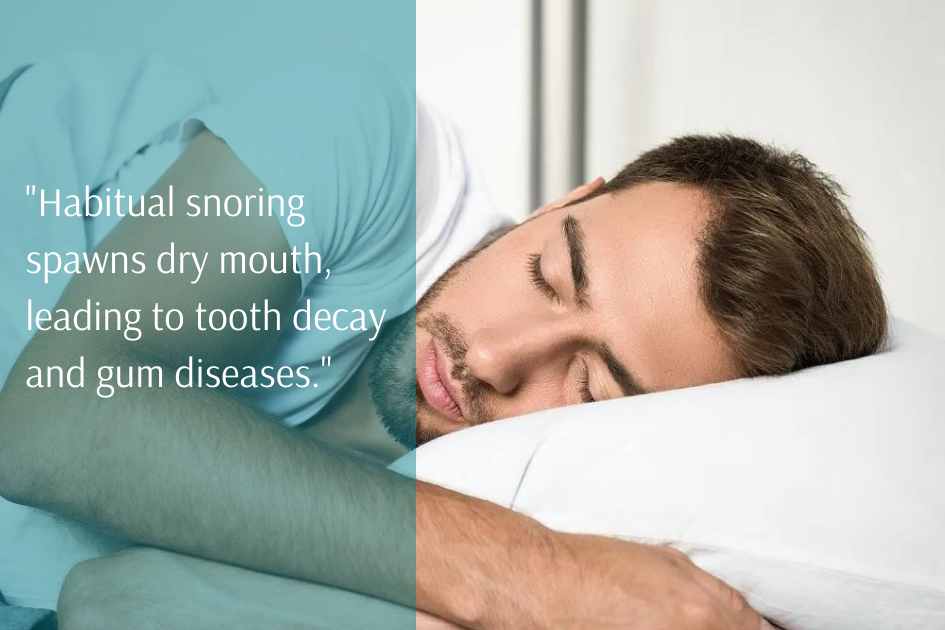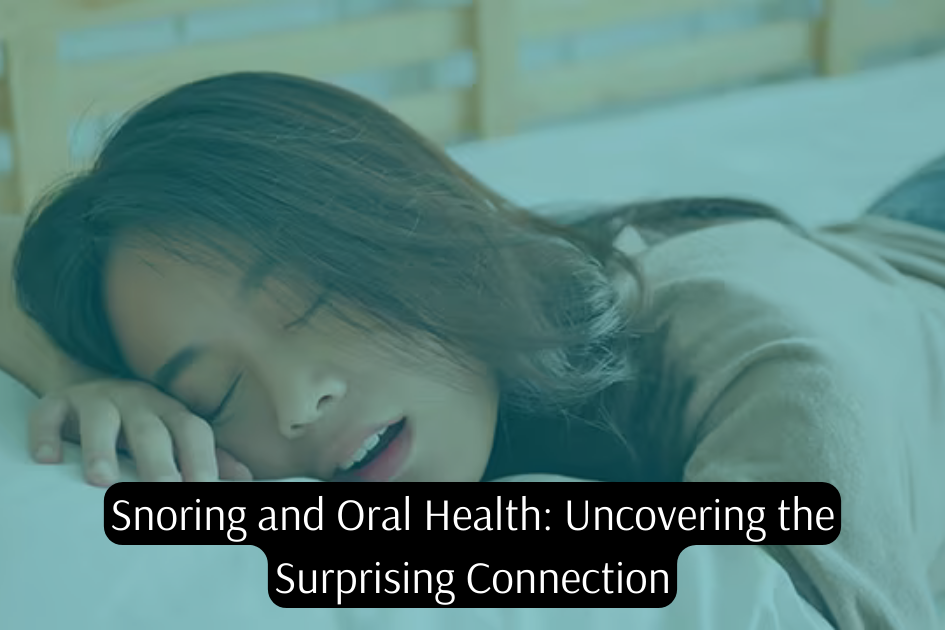Resembling an unwanted symphony performing during nighttime, snoring goes beyond just being irritating. The impact of such interrupted sleep patterns may extend to oral health, possibly inducing conditions such as dry mouth and gum disease.
The following discussion will outline the correlation between snoring and oral health, potential treatment options, and prevention tactics. Comprehending this relationship can aid individuals in preserving prime oral health and achieving a more peaceful sleep.
Understanding Snoring
Gaining a thorough comprehension of the connection between snoring and oral health necessitates knowledge about the primary causes of snoring. Snoring generally results from blocked airflow in the throat and nasal passages, often involving oral structures. The upcoming discussion will scrutinize the major factors causing snoring and the involvement of oral structures in this widespread yet frequently disruptive sleep occurrence.
What Causes Snoring
Exploring the causes of snoring requires an understanding that this widespread occurrence often arises from airway obstructions during sleep. Such obstructions might happen due to a variety of factors. These include a relaxed state of throat and tongue muscles, excessive throat tissue resulting from overweight conditions, or a lengthy soft palate and uvula that may reduce the passageway from the nose to the throat.
At Great Oaks Dentistry in New Braunfels, TX, seasoned professionals conduct thorough examinations to pinpoint potential causes and impacts of snoring on oral health. They underscore that persistent snoring might indicate severe health conditions, possibly sleep apnea, rather than being a minor issue.
The Role of Oral Structures in Snoring
Comprehending the significance of oral structures in snoring requires an in-depth examination of the mouth’s anatomy and functions, with particular emphasis on the tongue, soft palate, and uvula, and their roles in obstructing the airway during sleep.
An overly relaxed tongue can slip back into the throat, causing a blockage. The soft palate and uvula, being soft tissues, have the potential to collapse, obstructing airflow and inducing the vibrations that result in snoring. The existence of surplus fatty tissue or irregular growths in these regions can worsen such blockages.
It becomes clear that oral structures have a vital part in snoring, and this knowledge could aid in the creation of effective treatment methods and possibly enhance oral health on a larger scale.
Snoring and Its Impact on Oral Health

The significance of snoring’s effect on oral health demands attentive analysis. The link between snoring and conditions such as dry mouth can result in a variety of dental health complications. The ensuing discussion will examine the ways snoring affects oral health, its relationship with dry mouth, and the related dental conditions.
How Snoring Affects the Mouth
Numerous investigations suggest a potent link between habitual snoring and a range of oral health complications.
Habitual snoring, usually linked with sleep apnea, spawns a dry mouth condition termed xerostomia. This condition is a result of the open-mouth breathing pattern prevalent among snorers, leading to lowered saliva production.
The role of saliva in neutralizing acids and re-mineralizing tooth enamel is crucial, hence a decrease might result in tooth decay, gum diseases, and unpleasant breath.
The vibrations from snoring can also result in bruxism, or teeth grinding, which can cause tooth wear and potential damage to jaw joints.
It’s imperative for chronic snorers to consult with professionals to lessen these risks and uphold oral health.
The Connection to Dry Mouth and Oral Conditions
There exists a significant link between habitual snoring and conditions of dry mouth, leading to a range of other oral health complications. Habitual snorers often have a tendency to breathe through their mouths during sleep, which can result in dryness. This reduction in saliva makes it conducive for harmful bacteria to multiply, increasing the likelihood of oral diseases.
Gum disease, tooth decay, and oral infections are often seen in those suffering from persistent dry mouth. Dry mouth can also intensify snoring, forming a detrimental cycle. It also plays a role in causing halitosis, also known as bad breath, which can further deteriorate oral health.
It’s essential to understand this link between snoring, dry mouth, and oral health when devising comprehensive treatment strategies for those affected.
Snoring and Sleep Apnea
Exploring the connection between chronic snoring and sleep apnea, a grave sleep disorder with potential effects on dental health is crucial.
Sleep apnea is a condition where breathing stops during sleep, typically due to a blocked airway. This obstruction can arise from various factors such as:
- Swollen tonsils or adenoids
- Obesity resulting in extra throat tissue
- An inherently narrow airway
- Persistent nasal congestion
- Muscle relaxation at the back of your throat while sleeping
Chronic snoring often signals sleep apnea, and sadly, both issues can harm oral health. The regular disruption of breathing compels individuals to breathe through their mouth, resulting in dry mouth. Persistent dry mouth can cause a host of dental problems, including tooth decay and gum disease.
Dental Treatments for Snoring
Dental remedies for snoring offer substantial potential advantages for those dealing with this sleep disorder. One such remedy is the use of oral appliances. These appliances are designed to keep the airway open and unobstructed while sleeping. By doing so, they can significantly decrease both the frequency and severity of snoring.
In addition to oral appliances, there are other dental options available for managing snoring. One such option is positioning therapy. This involves finding the optimal sleeping position to reduce snoring. Another option is maxillofacial surgery, which can help correct any structural issues in the mouth or jaw that may be contributing to snoring.
By utilizing these dental remedies, individuals can experience improved sleep quality and overall wellness. These remedies address the root causes of snoring, allowing for a more restful sleep and a reduction in the negative effects associated with snoring.
Oral Appliances and Their Function
Various oral appliances, specifically designed for snoring treatment, are crucial in maintaining oral health. They ensure an unobstructed airflow during sleep. The devices work by either securing the tongue or adjusting the jaw position, enabling smooth breathing.
Here are some popularly used oral appliances for snoring:
- Mandibular Advancement Devices (MADs): These devices position the lower jaw and tongue forward, thus increasing the airway space.
- Tongue Retaining Devices (TRDs): These devices serve to hold the tongue in place, preventing it from obstructing the airway.
- Vestibular Shields: These are employed to compel mouth-breathing, which reduces snoring resulting from nasal blockages.
- Palatal Lift Prosthetics: These assist in decreasing snoring induced by the palatal flutter.
- Continuous Positive Airway Pressure (CPAP): This machine delivers a consistent stream of air to keep your airways open.
Other Dental Interventions for Snoring
Beyond the oral appliances previously mentioned for snoring, numerous other dental interventions exist that can significantly contribute to relieving this condition. Uvulopalatopharyngoplasty (UPPP), an ordinary procedure, involves the surgical removal of excess throat tissue to widen the airway. Then there exists the pillar procedure, placing small polyester rods into the soft palate thus stiffening it and reducing vibration.
Laser-assisted uvuloplasty (LAUP) employs lasers to remove or reshape the uvula, presenting another method. Finally, continuous positive airway pressure (CPAP) therapy, a non-surgical treatment, utilises a machine to augment air pressure in the throat and prevents its collapse during sleep. These alternatives extend further options for patients seeking snoring relief.
Lifestyle Changes and Home Remedies

Snoring often gets brushed off as a mere nuisance, but it’s worth noting that certain lifestyle modifications and home remedies can significantly diminish its occurrence and enhance overall oral health. It’s crucial to appreciate that snoring isn’t just a disturbance during sleep but might also signal potential health problems.
The following five lifestyle changes and home remedies might prove beneficial:
- Achieving and maintaining a healthy body weight: Extra body weight could heighten the probability of snoring.
- Engaging in regular physical activity: This might assist in decreasing snoring by enhancing respiratory function.
- Steering clear of alcohol and sedatives: These substances have the potential to relax throat muscles, thus inducing snoring.
- Adopting a side sleeping position: This might avert the tongue from obstructing the throat.
- Ensuring proper hydration: A dehydrated body could cause nasal and soft palate secretions to become stickier, making one more prone to snoring.
When to Seek Professional Help
While lifestyle modifications and home remedies can be effective in managing snoring, times may arise when professional assistance becomes necessary. This is especially true when these efforts prove unsuccessful or when the snoring is partnered with symptoms indicative of potential health issues.
Occurrences such as choking, gasping, or regular pauses in breathing while sleeping could be signs of sleep apnea. This serious condition necessitates immediate medical intervention. Also, if snoring leads to constant fatigue, difficulties with focus, or headaches in the morning, a visit to a healthcare provider is imperative.
Lastly, when snoring leads to social or interpersonal problems, it’s vital to look for professional assistance. A dentist or sleep specialist can conduct an in-depth examination and propose appropriate treatments, which might include oral appliances, continuous positive airway pressure (CPAP), or surgery.
Preventative Measures
A variety of preventative strategies can be utilized to lessen the chances of snoring and its possible effect on oral health, especially when other remedies and professional interventions fall short. These strategies decrease the occurrence of snoring and lessen the chance of associated oral health issues.
Reflect on these tactics:
- Pursue a healthy weight: Excess weight can augment snoring by applying added strain on the neck.
- Eschew alcohol and sedatives: These substances may relax the throat muscles, leading to more intense snoring.
- Adopt good sleep habits: Consistent sleep schedules can aid in snoring prevention.
- Positional therapy: Resting on your side might keep the tongue from obstructing the airway.
- Manage allergies: Lowering allergen levels in the bedroom could reduce snoring triggered by nasal blockages.
Taking a proactive stance against snoring can significantly enhance overall oral health.
Conclusion
Snoring has a significant impact on oral health, leading to conditions such as sleep apnea. Available treatment options vary from dental procedures to lifestyle adjustments, often necessitating expert advice for efficient management.
Emphasizing prevention can help lessen these negative effects, highlighting the critical role oral health plays in total wellness. Despite being common in today’s society, snoring shouldn’t be ignored as just a nighttime irritation but rather treated as a relevant health issue.

